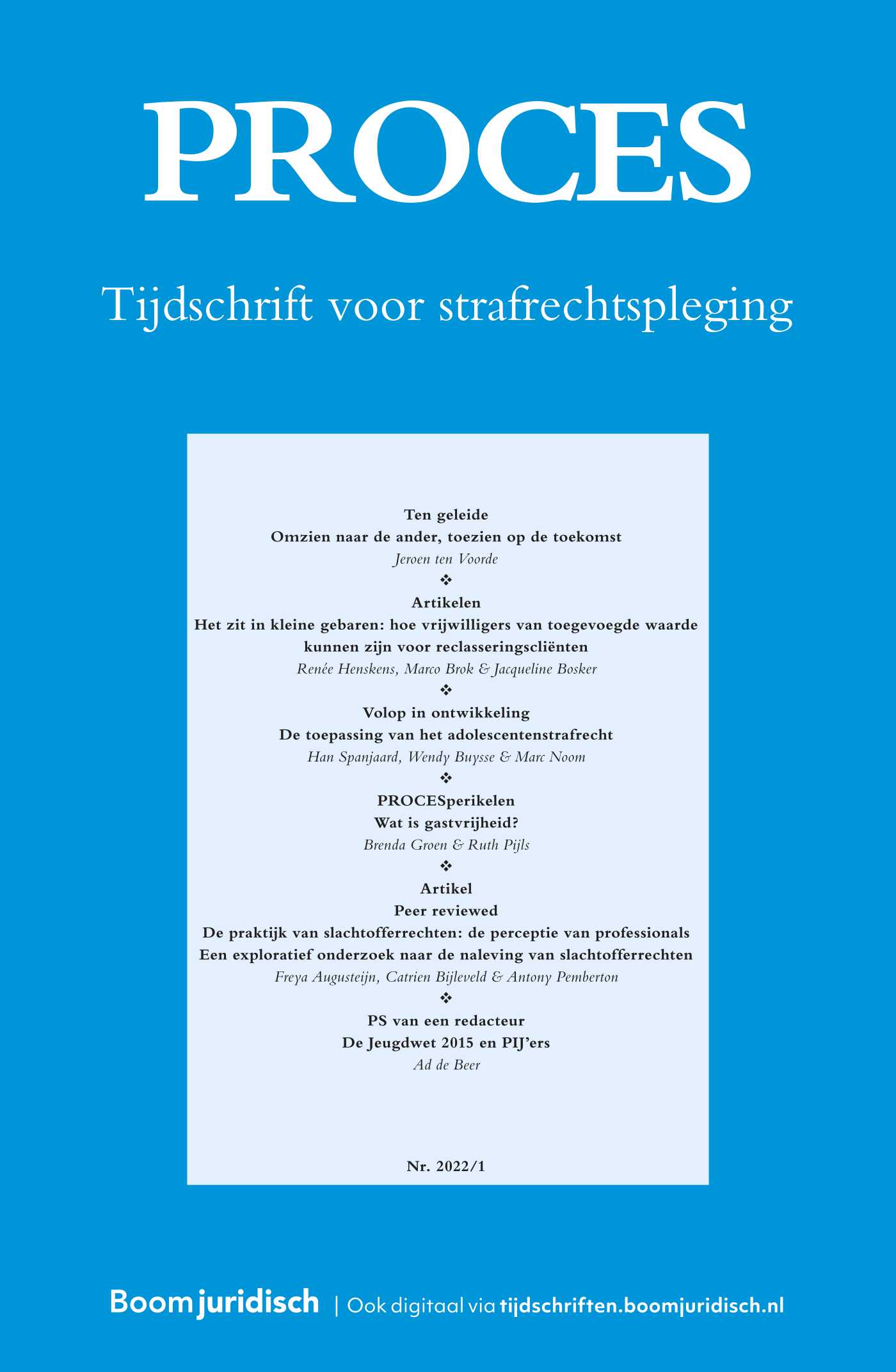|
Animals appear to be increasingly incorporated in pet assisted activities and in pet assisted therapies in detention. But if one reviews the literature on these projects, it becomes clear that not much attention is being paid towards methodological issues. In this contribution, a set of questions is presented in order to help those that are interested in starting such a program to construct a more thoroughly thought through project. In such a project, animal welfare should be one of the key features. |


PROCES
Meer op het gebied van Criminologie en veiligheid
Over dit tijdschriftMeld u zich hier aan voor de attendering op dit tijdschrift zodat u direct een mail ontvangt als er een nieuw digitaal nummer is verschenen en u de artikelen online kunt lezen.
| Redactioneel |
Substantiële dreiging |
| Auteurs | Mr. Sigrid van Wingerden en Mr. dr. Maartje van der Woude |
| Auteursinformatie |
| Artikel |
Dieren in detentieEen kritische blik |
| Trefwoorden | Detention, Animals, pet assisted activity, pet assisted therapy |
| Auteurs | Dr. Janine Janssen, Jessica Hoeven MSc, Vera Vermeulen MSc e.a. |
| SamenvattingAuteursinformatie |
| Artikel |
Een stap voorDe wijze waarop persoonsbeveiliging middels kennis en informatie verschuift van reactief naar proactief optreden |
| Trefwoorden | Politie, Persoonsbeveiliging, Cultuurverandering, Lerende organisatie |
| Auteurs | Nick Koeman MSc en Hans Overgaag |
| SamenvattingAuteursinformatie |
|
Within the Dutch National police force, the central security and protection division is responsible for the protection of the royal family, (foreign) heads of state and certain people who are threatened. During the past few years, the division has undergone a focus shift towards a more proactive service, based on intelligence. The main priority is to prevent attacks instead of the classical view of resisting and/or withstanding attacks. To make this development possible, the division has had to evolve into a learning organisation. The article focuses on the learning process and the challenges that have been overcome. Furthermore, future developments, that can either pose a chance or a possible threat to the on-going process, are taken into account. |
| Praktijk |
Perikelen rond de Dienst Vervoer en Ondersteuning |
| Auteurs | Mr. Cor Petiet |
| Auteursinformatie |
| Artikel |
Wraak de wrakingEen oproep tot herziening van de wrakingsprocedure in het Nederlandse strafprocesrecht |
| Trefwoorden | Wraking, Strafprocesrecht, Rechtsvergelijking, Art. 6 EVRM |
| Auteurs | Mr. Eva Borg |
| SamenvattingAuteursinformatie |
|
According to article 512 of the Dutch Criminal Procedure Code judges can be removed from a case due to facts or circumstances that (might) damage their impartiality. By analyzing how this procedure of challenge is used in practice, this research shows that it could and should be organised in a different way. Both with regards to the applicants, the challenged actors and the assessors of the procedure there are gaps and points of improvement in the current Dutch legislation. Suggestions for revision are gained from a comparative investigation of the challenge procedure in the Belgian criminal law system. |
| Artikel |
Gratie uit de gratie?Ontwikkelingen in gratiewetgeving, -verzoeken en -beslissingen (1990-2011) |
| Trefwoorden | Gratie, tenuitvoerlegging van straffen, Straftoemeting, Strafdoel |
| Auteurs | Mw. mr. Sigrid van Wingerden en Mr. dr. Ard Schoep |
| SamenvattingAuteursinformatie |
|
Under Dutch law, convicted criminals have the opportunity to request a pardon to cancel, reduce or alter their punishment. Pardoning is an important institute to guarantee fair and reasonable execution of sentences. However, little is known about the everyday practice of pardoning in the Netherlands. The current study sets out the legal framework of the institute of pardoning, as well as changes in pardoning law and policy. We demonstrate that over the period 1990-2011 both the amount of pardoning requests and decisions have decreased dramatically, and that the period 1995-2004 is characterized by an upsurge of conditional pardons at the expense of both unconditional pardons and pardon denials. We try to explain these developments in the light of changes in pardoning law and policy, prison overcrowding, increases in life sentences and of royal celebrations. We conclude that we cannot fully explain the developments in the pardoning practice and that better registration of the pardoning requests and grants are needed for a better understanding of the pardoning practice. |
| Artikel |
Als iemand wordt vermoordDe gevolgen en hulp voor de nabestaanden |
| Trefwoorden | Survivors, co-victims, Casemanagement, victim assistance |
| Auteurs | Dr. mr. Anton van Wijk en Drs. Ilse van Leiden |
| SamenvattingAuteursinformatie |
|
In recent years, not only victims of serious crimes, but also their relatives received increased attention in criminal justice procedures. Victim Support Netherlands started a project in which paid professionals support surviving relatives of murdered victims. Through interviews and questionnaires, a group of 62 surviving relatives was followed for two to three years, to map out what their problems and needs are, how the case manager helped them and how they appreciated the help. Problems and needs include psychological, practical, social and legal matters. The appointment of a case manager appeared to be very valuable for the surviving relatives. Partly because of the case manager, they managed to get back to everyday life. |
| Column |
Maatwerk op vrijdagmiddag |
| Auteurs | Mr. Coosje Peterse |
| Auteursinformatie |
